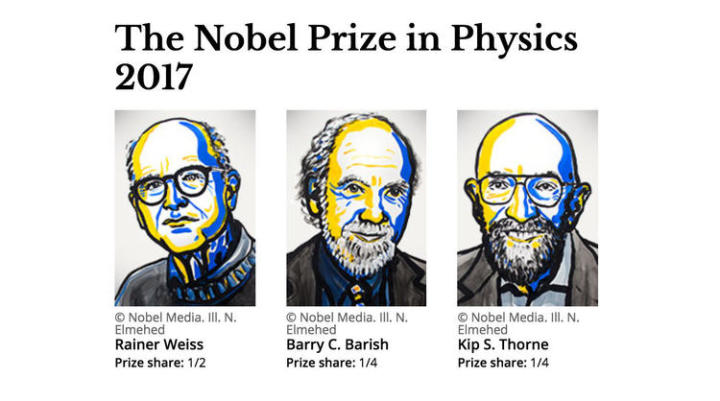(单词翻译:单击)
听力文本
This is Scientific American — 60-Second Science. I'm Steve Mirsky.
"The Royal Swedish Academy of Sciences has decided to award the 2017 Nobel Prize in Physics with one half to Rainer Weiss and the other half jointly to Barry C. Barish and Kip S. Thorne, all of them members of the LIGO/VIRGO collaboration. And the academy citation runs for decisive contributions to the LIGO detector and the observation of gravitational waves."
Göran Hansson, secretary general of the academy, at 5:52 this morning Eastern time.
"Rainer Weiss was born in 1932 in Berlin in Germany. He received his PhD at the Massachusetts Institute of Technology in the United States, and he is still affiliated with the M.I.T. as professor of physics. Dr. Weiss is since (sic) many years a U.S. citizen. Barry Barish was born in 1936 in Nebraska in the United States. He's a professor of physics at Caltech, the California Institute of Technology. And finally, Kip Thorne was born in 1940 in Utah, in the U.S., and he's currently professor of theoretical physics at Caltech."

"And as I mentioned, all three Nobel laureates are members of the LIGO/Virgo collaboration, a large team of more than a thousand scientists who built and ran the detector that was used to discover gravitational waves. And with that, I'll give the word to the chairman of the Nobel committee, Nils Mårtensson."
"On the 14th of September, 2015, the Laser Interferometer Gravitational Wave Observatory, LIGO, succeeded for the first time to directly observe gravitational waves. These waves were predicted by Einstein a hundred years ago, but until now they have escaped direct detection. This is a truly remarkable achievement, which crowns almost 50 years of experimental efforts by hundreds of scientists and engineers. And today the LIGO collaboration includes a thousand members from 90 institutions on five continents...we now witness the dawn of a new field: gravitational wave astronomy. This will teach us about the most violent processes in the universe and it will lead to new insights into the nature of extreme gravity."
For an in-depth listen about the 2017 Nobel Prize in Physics, look for the Scientific American Science Talk podcast later today.
For Scientific American — 60-Second Science Science. I'm Steve Mirsky.
参考译文
这里是科学美国人——60秒科学。我是史蒂夫·米尔斯基。
“瑞典皇家科学院决定将2017年诺贝尔物理学奖一半授予雷纳·韦斯,另一半授予巴里·巴里什和基普·索恩,三人均来自LIGO/VIRGO(美国激光干涉引力波天文台和意大利“处女座”引力波探测器)合作组。瑞典皇家科学院的颁奖词写道:此奖以表彰他们对LIGO探测器和引力波观测的决定性贡献作用。”
美国东部时间今晨5点52分,瑞典皇家科学院秘书长戈兰·汉森公布了这一消息。.
“雷纳·韦斯于1932年出生在德国柏林。他在美国麻省理工学院获得博士学位,现在是麻省理工学院的物理学教授。韦恩博士在多年前成为美国公民。巴里·巴里什1936年出生在美国内布拉斯加州。他是加州理工学院的物理学教授。基普·索恩, 1940年出生在美国犹他州,现在是加州理工学院的理论物理学教授。”
“如我之前所提到的,这三位诺贝尔奖获得者均来自LIGO/Virgo合作组,该组织是由1000余名科学家所组成的庞大团队,这些科学家建立并运行了发现引力波的探测器。下面,有请诺贝尔奖委员会主席尼尔斯·莫滕松来详细介绍。”
“2015年9月14日,激光干涉仪引力波探测器,即LIGO,首次成功直接观测到了引力波。爱因斯坦曾在100年前预测过引力波,但直到现在引力波才被直接观测到。这真是一项卓越的成就,而这要归功于近50年来数百位科学家和工程师的实验努力。今天,LIGO合作组拥有来自五大洲90个研究所的上千名成员,而现在,我们见证了引力波天文学这一新领域的开端。这将告诉我们宇宙最强烈的过程,还将引出极端引力性质的新见解。”
若想深入了解2017年诺贝尔物理学奖的相关信息,请关注今天晚些时候发布的科学美国人“科学对话”播客。
谢谢大家收听科学美国人——60秒科学。我是史蒂夫·米尔斯基。
译文为可可英语翻译,未经授权请勿转载!
重点讲解
重点讲解:
1. decide to do sth. 决定,拿定主意(做);
例句:I'll engage for John's behaviour should you decide to employ him.
如果你决定聘用约翰,我愿为他的行为担保。
2. more than 超过;超出;
例句:Inflation, which has usually been in single figures, is running at more than 12%.
通常保持在个位数的通货膨胀率现在已超过了12%。
3. for the first time 首次;第一次;
例句:For the first time in months, my spirits soared.
几个月来,我的情绪第一次高涨起来。
4. lead to 招致;致使;导致;
例句:The improper use of medicine could lead to severe adverse reactions.
用药不当会产生严重的不良反应。


